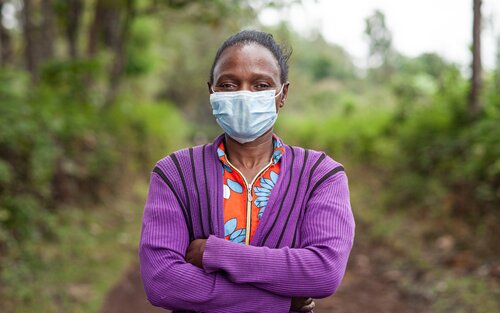The Covid-19 pandemic presents particular risks for many persons with disabilities around the world. Indeed, the Chair of the United Nations Committee on the Rights of Persons with Disabilities and the Special Envoy of the United Nations Secretary-General on Disability and Accessibility called upon all relevant authorities to adopt measures to appropriately respond to the pandemic, ensuring inclusion and the effective participation of all persons with disabilities.
The disability movement in Kenya likewise, have equally been calling upon the government to make extra efforts to protect the rights of all Kenyans with disabilities in every response to the pandemic. Persons with disabilities have the right to self-determination, independence and autonomy, as well as the right to education and employment on an equal basis with others. However, the breakdown of vital support systems and networks as a result of this pandemic exacerbates the obstacles that persons with disabilities face in exercising these rights.
It is crucial we ensure that a prolonged disruption caused by this emergency does not result in rollbacks of the rights that as persons with disabilities and representative organizations we have worked so hard to advance. Universal human rights, including the rights of persons with disabilities, must not be infringed upon in the time of a pandemic and going forward.
Under various Conventions that Kenya has ratified, including the Convention on the Rights of Persons with Disabilities (CRPD), governments must guarantee the rights to information, health, education, and basic standard of living. Governments must ensure accessibility and reasonable accommodation for persons with disabilities are avaliable and that they can live independently in the community, with support as necessary.
The article 11 of the CRPD establishes that State parties shall take all possible measures to ensure the protection and safety of persons with disabilities in the national response to situations of risk and humanitarian emergencies. This comprises measures in all areas of life of persons with disabilities, including the protection of their access to the highest attainable standard of health without discrimination, general wellbeing and prevention of infectious diseases, and measures to ensure protection against negative attitudes, isolation, and stigmatization that may arise in the midst of the crisis. The Kenya Constitution in its bill of rights equally guarantees the right to health and right to social and economic needs.
In a rapidly evolving pandemic, information is essential for people to make decisions about how to protect themselves and how to access necessities and services during quarantine and self-isolation. It is commendable that information is being provided regularly especially through the Ministry of Health briefs which come through both electronic and print media. However, this is not reaching a proportion of the society that cannot interact with these media forms.
To ensure that persons with disabilities are not deprived of lifesaving information, different communication strategies should be implemended, such as, qualified sign language interpretation for televised announcements, websites that are accessible to people with different disabilities, and telephone-based services that have text capabilities for people who are deaf or have dificulty hearing. In addition, communications should use plain language to maximize understanding.
Living conditions and vulnerabilities
Many adults and children with disabilities live in often overcrowded residential informal urban settings where they face neglect, abuse, and inadequate health care. Governments should take urgent steps to identify and attend to persons with disabilities in such informal settings. Also, a lot of persons with disabilities have other secondary conditions which make them more vulnerable to attack by diseases. Without swift action by the government to include persons with disabilities in their response to Covid-19, they will remain at serious risk of infection and death as the pandemic spreads.
Support Services
There is need to ensure that community-based social support is strengthened to support persons with disabilities and to ensure basic daily needs are met, such as, meals and hygiene. Additionally, the government should take all appropriate measures to ensure access for persons with disabilities to health services and provide them with the same range, quality and standard of health care as provided to other persons, including mental health services. Priority should be given to address situations of poverty that disproportionately face persons with disabilities. Food subsidies and other means of social protection should be accessed by persons with disabilities as necessary.
Most importantly, government in its endeavour to protect persons with disabilities during the coronavirus pandemic will need to consult with them regularly to make sure policies and practice in regard to the pandemic meet their needs. They should be effectively and meaningfully involved in the design and implementation of awareness raising and public education campaigns.
Anderson Gitonga

